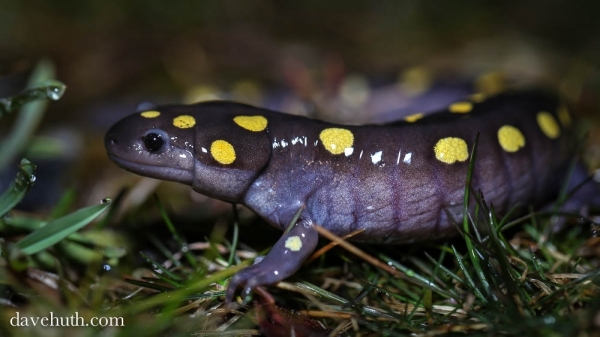April showers bring May flowers, the proverb reminds us; for those who hanker for instant gratification, however, there is something else that April showers bring - amphibians. Once the showers begin, we don't need to wait until May, we only need to wait until dark.
On those April nights when it's raining and temperatures get above 40 degrees, the spotted salamanders, Jefferson's salamanders, and wood frogs emerge from subterranean dormancy. Terrestrial and solitary most of their lives, these spring rains trigger their annual urge for aquatic social activity. Most head to vernal pools, small temporary bodies of water where the business of procreation occurs.
For many of these amphibians, this spring migration takes them across roads, and mortality can be very high. The Bonnyvale Environmental Education Center organizes salamander crossing brigades to help these amphibians.
While salamander crossing guards have the opportunity to see and save individual salamanders, they also help to ensure that enough survive each year to perpetuate the species. Studies have shown that in places where salamanders must cross even moderately traveled roads they will eventually disappear - unless they get some help.
Salamander crossing guards show up at a documented crossing site just after dark and, with a bright flashlight, stroll up and down the road (usually a stretch of about a quarter-mile). When a salamander or frog appears on the road, a crossing guard will pick it up and give it a lift to the other side.
BEEC is hosting two trainings for those interested in participating.
The first is on Wednesday, March 28, at Three Penny Lodge, 492 Dover Rd., in South Newfane. The presentation begins at 6:30 p.m. Refreshments will be served.
The second will be on Friday, March 30, at 7 p.m., at Landmark College in Putney. The training will take place in the McFarlane Science, Technology, & Innovation Center in room 221.
For more information on these free trainings, or to sign up, visit www.beec.org, or call 802-257-5785.
If you would like to help, but can't make it to a training, you will find much of the information you need at BEEC's website.
There, you will find a map of known crossing areas in southeastern Windham County, instructional videos, information on the amphibian species you might encounter on migration nights, and data sheets. There are also recommendations for locating crossing sites if none have been mapped in your area.
If you can't become a crossing guard, the next best thing is to stay home on those first rainy nights of spring when the temperature is above 40 F. If you must drive, keep an alert eye tuned for amphibians in the road.
If you can safely pull over, a closer look might reveal the yellow polka dots of a spotted salamander. Give it a lift across the road and you will be assuring one traveler a successful journey to its vernal pool.
